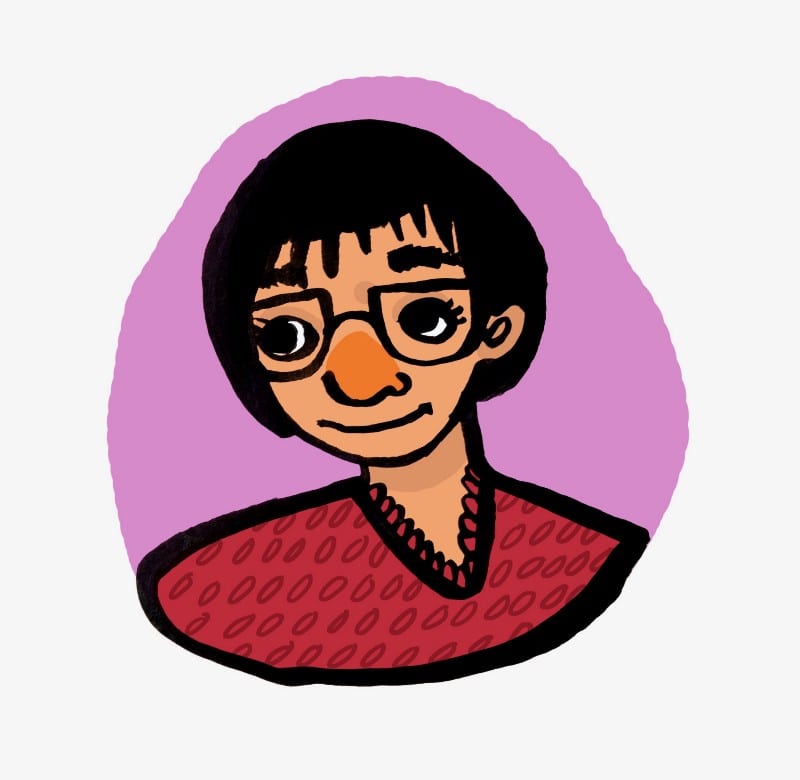
Fanny Diego-Alvarez was born in the state of Guerrero in Mexico and moved with her family to Little Village when she was six years old.
Above.Fanny Diego-Alvarez. Illustrated by Natalie Gonzalez
Fanny Diego-Alvarez was born in the state of Guerrero in Mexico and moved with her family to Little Village when she was six years old. She comes from a long line of community organizers and is a familiar face at political rallies and neighborhood events. Between 2005 and 2017 she worked at Enlace, a capacity building organization in Little Village. She now works as the sustainable community schools project manager at Chicago Public Schools. This initiative, jointly created by the Chicago Teachers Union and Chicago Public Schools, aims to support neighborhood schools by investing in wraparound services, restorative justice practices, culturally relevant curricula, and family engagement.
Borderless sat down with Fanny to talk about the challenges facing immigrants in Little Village today.
In Little Village, our community struggles with the issue of status, because we have such a large immigrant population. Our community faces other challenges too. For example, our schools are not adequately resourced and yet schools and students are our greatest assets. I’ve been a strong advocate of neighborhood schools for the last fifteen years. I have seen them work for students, I have also seen them fail students. I know that if we have strong schools, our community is stronger.
I had amazing teachers in grammar school and high school, people that really focused on validating my experiences and my identity. One teacher, in particular, I remember she had us write out our story, whatever we wanted to share. Then after each of us read it out loud in front of class, she would tell us that we were destined for greatness. If you’re told that in fifth grade, you start believing it. Yeah, my story is full of courage.
Meanwhile, in fourth grade, there was a program where they would set you up with a bank account. I remember this speaker coming in and saying, to set up your bank account, you’re going to need your social security number. As an undocumented person, I was quiet about it, especially back then. But there was this one young lady, naïve and bold at fourth grade, she was like, what if you don’t have a social security number? The guy told her, you shouldn’t be here if you don’t have a social security number. He said this to fourth graders. It was acceptable back then for someone to just say things like that to children. I know it happens today too, we just hear less about it.
So to have a fifth grade teacher tell you completely the opposite — saying this is who you are and there’s nothing bad about it. That you’re courageous and beautiful. I came across a lot of that, a lot of people saying, so what if you’re an immigrant? So what if you’re undocumented? You have something to contribute, you have a powerful voice. Even if you can’t vote, if you can turn out 100 voters, you did your part. I was a precinct captain way before I could vote.
I think that is something unique to Little Village. People here are really part of a larger community, and we are here to stay. Years ago, there were times when immigration officers would stop by and before even a community based organization would know about it, all the tamale sellers had already called their neighbors and spread the news. Within 20 minutes everybody knew immigration was here. That was before any of the nonprofits opened their doors for the morning. Today we have a rapid response team, all volunteer, who lead the charge of investigating and verifying potential ICE raids and then connecting people to resources. You don’t see that group claiming recognition, because it is not about that, it is about caring for one another. I am proud to be from this community.
The neighborhood continues to be a hub for innovation and resistance. We went for Bernie Sanders and voted for for Kim Foxx. Chuy Garcia is from Little Village. It’s because there’s a lot of political education happening all the time. It isn’t perfect, but we work hard at it.
We have people here who have deep roots in the community. Because there hasn’t been a way to fix papers or it’s been too dangerous to call attention to yourself, you have people who have been living here for 30 years without documentation. But people understand that they deserve better and see self-representation and self-determination as an important part of the immigrant experience.
I was recently asked about my proudest accomplishment for an interview. My response was that I am part of a larger narrative and that I am not individually successful. We don’t need successful people, we need leaders. We’ve always had talented individuals that “make it.’ I’ve decided to make it with my people, that we have collective progress. Being part of a collective narrative is who I am and what drives my life’s work.

